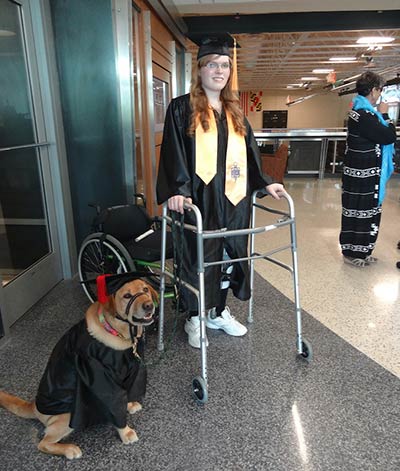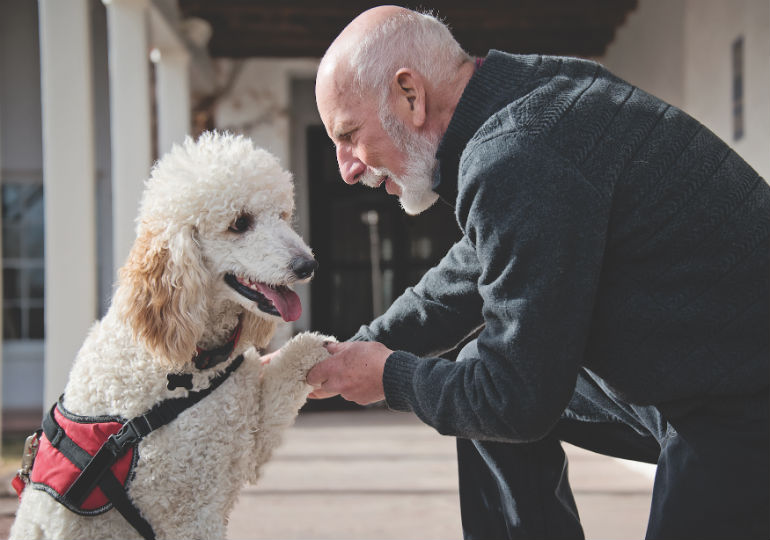Since the first issue of AKC Family Dog in 2003, we have been telling the stories of service dogs who guide the blind, hear for deaf, perform household tasks for wheelchair users, indicate on impending seizures and diabetic trauma, and perform many other jobs for disabled owners.
During our 13-plus years of interviewing service-dog owners of all ages and from all walks of life, there has been one constant theme: Service dogs not only perform the tasks they were trained to do, they also provide unanticipated benefits. Time and again we hear how a service dog has helped someone work through the depression that accompanies permanent disability, how the independence that a dog provides can rebuild self-esteem, and how the presence of a dog at the side of a disabled person can change the attitude of observers from pity to admiration.
“Before Teddie, children used to whisper to their parents and ask why I was in a wheelchair; adults would look at me with pity,” young paraplegic Krystal Grecco said in our March/April “Heroes & Helpers” column about her service dog. “Now, kids will get excited to talk about the dog they saw in the grocery store, and people have no problem asking me about my dog or complimenting us on our teamwork. My outlook on life has taken a complete 180, and I cannot imagine it without her.”

A few years earlier, another young service-dog owner, Shanna Wilkinson, told us about Holly, her seizure-alert Sheltie: “She is more than just another dog, she’s my life, my love, my protector, my everything. Holly has given me the strength and courage to follow my dreams, despite epilepsy.”
No doubt about it, service dogs provide ancillary benefits. This has been common knowledge to us and our readers for years, but the evidence has always been purely anecdotal. Now, researchers at Purdue University’s College of Veterinary Medicine are applying scientific method to prove that “in addition to the physical benefits service dogs provide their owners, they also contribute to emotional and psychosocial well-being.”
The ambitious three-part, four-year study is a collaboration among Purdue, Elanco Animal Health (a division of Eli Lilly), and Canine Assistants, a nonprofit service-dog organization based in Milton, Georgia. Purdue’s Maggie O’Haire, assistant professor of human-animal interaction, heads the research team. (O’Haire also leads Purdue’s Organization for Human Animal Interaction Research, a worldwide network of “collaborators, students, and community members working together to conduct rigorous scientific research on the unique and pervasive effects of interacting with animals.”) The Purdue team also includes Ph.D. candidate Kerri Rodriguez and postdoctoral research fellow Jess Bibbo. The researchers presented preliminary results at February’s North American Veterinary Conference in Orlando, Florida.
“Even though the benefits of service dogs for those with physical disabilities are well-recognized, the emotional and psychosocial effects are largely unknown,” O’Haire says. “There is a wealth of positive anecdotal information but comparatively few data-driven scientific measures of how dogs affect their human companions’ sense of well-being. We hope to fulfill the critical need for additional research on this topic.”
Doing the Science
In phase one of the study, researchers conducted more than 1,500 telephone interviews with service-dog owners and disabled persons on waiting lists for service dogs. O’Haire explains, “We trained our research assistants in how to make these standardized calls. We didn’t just want to call and have a chat, and then not be able to capture this data. So, we trained the research assistants to a very specific script and protocols.”
Additionally, the study evaluated the emotional and psychosocial benefits of the human-animal bond for family members—parents, caregivers, and spouses—of service-dog recipients. It took many hours of careful, controlled fact-finding. “A lot of people think that my job is playing with puppies all day—I wish that were the case!” O’Haire says. “Actually, it’s a lot of time on the phone, collecting data, and analyzing data.”
Among the preliminary findings were that service-dog owners showed a higher overall quality of life and better emotional, social, and work or school experiences than disabled persons who had not yet received a service dog; that family members of service-dog users exhibited better social and emotional functioning, as well as decreased worry, as a result of the recipient’s health than family members on the waitlist; and that family members with a service dog also exhibited better management of daily family activities than family members on the waitlist.
The research at Purdue continues. O’Haire and her team hope to confirm the initial results and provide information to scientifically verify the benefits of service dogs in particular and the human-animal bond generally. A statement from Elanco, funder of the project, concludes, “This research is considered to be a critical step in providing much needed scientific evidence as a basis for fostering more serious attention to human-animal bond dynamics and related issues and policy concerns.”
Science is confirming what the service-dog community has been telling us for years: The love and support of a good dog can help a disabled person live a happier life and be more fully accepted in their community. Among the service-dog owners we have presented in our pages, it was perhaps put best by Lon Hodge, a Vietnam veteran with post-traumatic stress disorder: “People tell me, you don’t look like you need a service dog. And I say, that’s because I have a service dog.”


